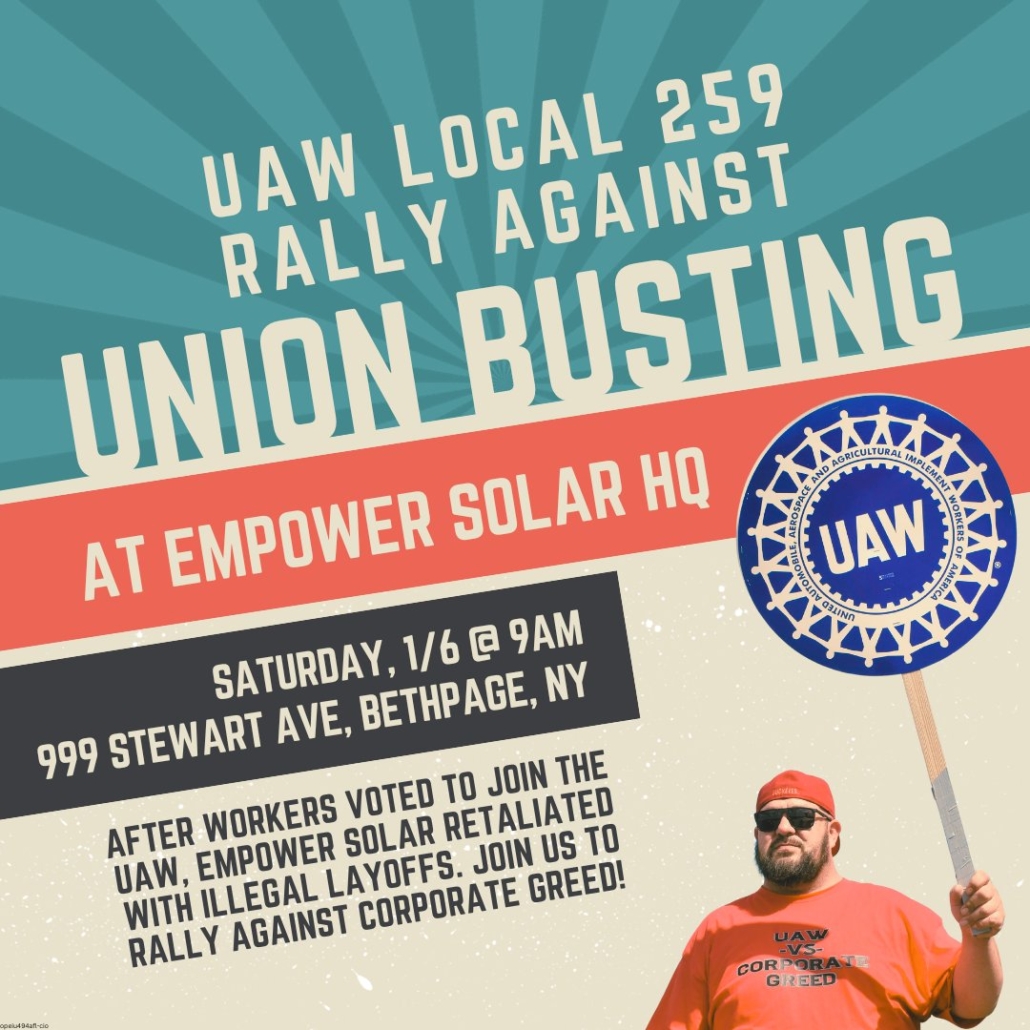New York, New York – Seeking to strengthen high-quality free legal services for New Yorkers and fight high turnover, union members of Mobilization for Justice (MFJ), a nonprofit legal services organization, hit a historic landmark this week as their strike enters its seventh week. The strike is the longest legal services walk-out in New York City history since 2003, when unionized MFJ staffers held a nine-week long strike.
The Union is fighting for a fair and dignified contract to maintain its quality of free legal services to New Yorkers by addressing MFJ’s unprecedented staff attrition rate. The strike has garnered support from state and national elected officials, such as U.S. Congressman Jamaal Bowman, who joined the picket line last week. Labor leaders have also joined the strikers in their demands that MFJ offer a fair contract. In a rally in North Carolina last week, UAW International President Shawn Fain issued a stern rebuke against MFJ Management’s union busting: “the management at MFJ is a disgrace and they are betraying the values that they claim to hold dear. But I know one thing: our members are strong, that the community’s behind them, and that they are going to win!”
In 2003, Mobilization for Justice (then known as MFY Legal Services) staffers struck for nine weeks when Management offered a contract which would eliminate spousal/partner health coverage. Chaumtoli Huq, an Associate Professor at CUNY School of Law and former MFJ staff attorney, was part of the 2003 strike. Professor Huq said that the proposed healthcare cuts would have disproportionately affected lower-paid, BIPOC workers. “I was pregnant with my son during the 2003 strike. Cutting my spousal health care would have meant that I would have had to pay more out-of-pocket expenses for family care. Legal services workers should have a right to support our loved ones, especially when we make so little money.” Professor Huq said that she “absolutely” supports the ongoing strike and Union members’ demands for a fair contract. “MFJ’s corporate board has forgotten an important lesson from the 2003 strike. You cannot strip frontline workers’ healthcare benefits and pay and expect them to take it without a fight.”
The current strike comes in the context of the worst homelessness crisis in modern New York City history, increasing evictions of poor and working-class tenants, and the unprecedented need for legal services for immigrants given recent waves of mass migration of asylum-seekers and refugees. Striking workers from MFJ include attorneys, paralegals, and social workers who advocate and represent these individuals in courts and in front of city, state, and federal agencies every day when working. “MFJ Union members are at the courts multiple days each week as part of our strike-focused Court Watch. We’re watching, with heartbreak for our clients, as MFJ managers clearly cannot handle the caseloads,” said Craig Hughes, social worker at MFJ’s Bronx office. “Executive Director Tiffany Liston has prolonged a strike on the backs of the clients MFJ is sworn to support. She is clearly indifferent to what happens to our clients, frontline staff, middle management, and the sustainability of the organization as a result.” He continued, “seven weeks in and MFJ is falling apart. Where is the leadership?”
Union members say that MFJ Management has delayed resolution of their contract negotiations, engaged in unfair labor practices, and mounted an aggressive union busting campaign. MFJ Management terminated staff healthcare without notice to staff hours after the Union declared a strike. This sudden, unannounced interruption in benefits caused Union members significant problems, including a Senior Staff Attorney whose three-year-old child was hospitalized with Leukemia. MFJ Management did not return to the bargaining table until the fourth week of the strike. MFJ Management also hired temporary strikebreakers to cover the labor shortage. Union members say that the untrained strike breakers are unable to adequately cover the organization’s caseload, which reached over 15,000 last year. Members expressed concerns that MFJ Management’s prolonged refusal to bargain in good faith will negatively impact their clients.
The MFJ Union will be picketing at the following locations this week:
– Wednesday, April 10, 1pm to 3pm: Bronx Housing Court (1118 Grand Concourse)
– Friday, April 12, 9:30am to 11:30am: MFJ Manhattan office (100 William Street)
Tag Archive for: Region 9A
New York, NY – After more than six months of bargaining their successor contract, teaching fellows, teaching assistants, course assistants, research assistants, and tutors at The New School, represented by United Auto Workers (UAW), will go on strike this coming Wednesday. Having authorized their strike with 94% voting yes, and a historic 77% of members participating, academic student workers have a powerful mandate for its work stoppage. For over half a year the workers have bargained continuously and in good faith with The New School. The university, meanwhile, has dragged its feet, and offered insulting poverty wages in a time of skyrocketing inflation. The strike will proceed unless the university comes back to the table before March 6 with an acceptable offer.
Less than one year after their professors walked off the job for 25 days, academic student workers began negotiating the terms of their new union contract. The workers are asking for higher wages and improved health care, alongside workplace and standard of living reforms like access to a childcare fund and better support for international students. Unlike many graduate students in the U.S., most at The New School pay tuition and do not receive stipends. The average academic student worker makes about 11K per year, and none make more than 24K. This is a special hardship for international students who are restricted from most forms of off-campus work. Academic student workers do not earn a New York City living wage and none make enough to afford even a shared apartment within a 90-minute commute from campus. To be an academic student worker at The New School is to be in a state of near constant financial anxiety.
Union members regularly report delays in pay and disbursement of stipends due to bureaucratic mismanagement by the university, which has left several members scrambling to figure out how to pay for basic necessities like housing and transportation. Workers have been forced to draw down from savings or rely upon the goodwill of friends, with little to no clarity from the university on when these issues will be resolved.
These experiences are not exclusive to research assistants. Non-academic student workers in a range of campus locations including dorms, libraries, wood and metal shops, admissions offices, Human Resources, Information Technology, and more are prepared to walk off the job with their colleagues. The predominantly undergraduate workforce is awaiting a ruling from the National Labor Relations Board about their ability to form a wall-to-wall student worker union with the striking academic student workers.
Academic student workers are 6.5% of the total workforce at The New School. They are asking for a compensation and health care package that would be worth less than 1% of the university’s operating budget. The university’s last insulting compensation offer for the over 500 workers, which wouldn’t even begin to address their financial hardship, is for less than what New School executives made in bonuses alone in 2022. While academic student workers experience both housing and food insecurity, New School executive salaries continue to bloat, with pay packages, including bonuses, on par with those at far wealthier Ivy League institutions. Perpetually strapped for cash, The New School still spends big on executive salaries by keeping its labor force—the workers that actually keep the school going—in abject poverty.
At a university founded on progressive values, and once a sanctuary to scholars fleeing the spread of fascism in Europe, the union believes that The New School can do better not just for its academic student workers, but for its workforce and student population as a whole. Academic student workers are merely picking up where their professors left off. Barring an acceptable offer from the university, the workers will strike for higher wages and for the betterment of the university community as a whole.
# # #
About ACT-UAW 7902: Founded in 2002, ACT-UAW Local 7902 represents over 5,000 part-time and adjunct teachers, student educators, and healthcare workers. It consists of four units: the NYU Adjuncts, New School part-time faculty, student employees at The New School, and New School student health service employees.
NORTH ADAMS, MA — Unionized employees of MASS MoCA will go on strike starting Wednesday, March 6 if no agreement on wages is reached with the Museum before then. Employees will begin picketing the Museum starting 8 am on Wednesday, March 6 and will picket daily until an agreement is reached.
The employees’ union, part of Local 2110 UAW, was originally formed in April of 2021. After a one day strike in August of 2022, employees reached an agreement on a first contract which allowed them to re-open the agreement in October 2023 to negotiate further wage increases. Negotiations on the wage reopener have been ongoing for four months but no agreement has been reached.
Fifty-eight percent (58%) of the 120 employees are earning just $16.25 per hour. Average pay for full-time employees is $43,600. According to The Economic Policy Institute’s family budget calculator, for a modest living in Berkshire County, a single individual with no children needs to earn approximately $47,000 per year while a family of four needs about $118,000. The Union is seeking to raise the hourly minimum rate to $18.25 by October of 2023 and is also seeking a minimum 4.5% increase this year.
MASS MoCA sent out a March 1 email to union members characterizing its rejection of the Union’s offer: “The Museum cannot agree to terms that will diminish our mission or operational sustainability, upend vital partnerships, reduce our programs, or fundamentally change our creative workplace culture. Simply put, MASS MoCA has been and will continue to be moved to adopt proposals that are balanced, fair, sustainable, and honest.”
The Union says the difference between its and the Museum’s base wage proposal is only an additional $150,000 for this year, and that workers need the money just to make ends meet. Moreover, the Union asserts that the Museum has increased the number of higher-paid management positions at the expense of the unionized staff.
“MASS MoCA seems out of touch with our needs and concerns as employees,” said Meg Labbee, a 25 year employee of the Museum who works in Artists Services. “They say the arts and artists come first but they need to show some regard for the people who work here. We love the work, but we deserve respect and fair conditions.”
Labbee, who is from the nearby town of Adams, adds, “Many of us live locally and our pay has not kept pace with the cost of living. By raising pay to something more livable, MASS MoCA would not only be supporting its employees, but helping lift the community, MASS MoCA’s rejection of our reasonable proposal has left us with no choice but to strike the institution we love.”
The March 6 strike deadline is not the first time bargaining with the Museum has been contentious. In 2022, during initial contract bargaining, the Union filed unfair labor practice charges with the National Labor Relations Board over the Museum’s bad faith bargaining, and employees engaged in a one-day strike. Then, this past November, the Union filed a complaint against the Museum with the Occupational Safety and Health Administration (OSHA) when the Museum ordered workers to remove flooring contaminated with loose asbestos without proper equipment or training. OSHA has since issued test results confirming the presence of asbestos, cited necessary corrections to the Museum and is conducting an ongoing investigation.
In April 2021, the MASS MoCA staff voted overwhelmingly to unionize with UAW Local 2110. The bargaining unit includes approximately 120 employees who work as educators, curators, custodians, museum attendants, box office staff, art fabricators, technicians, and other administrative and professional staff. UAW Local 2110 is a technical, office and professional union that represents many museums and cultural institutions in the northeast including the Museum of Modern Art, the MFA, Boston, the Portland Museum of Art, the Whitney Museum of American Art, the Guggenheim, the Jewish Museum, the Harriet Beecher Stowe Center, the Brooklyn Academy of Music, and other non-profit and educational institutions.
NEW YORK CITY – Full time, non-tenure track faculty at New York University have voted by an overwhelming margin (553 to 72, or 89.5%) in favor of joining Contract Faculty United – UAW (CFU-UAW), according to ballots tallied Wednesday night by the American Arbitration Association. CFU-UAW will represent nearly 1,000 Contract Faculty across NYU.
“With participation from nearly 67% of the unit, this is a resounding vote for our union,” said Ahmed Ansari, Industry Assistant Professor in Technology, Culture and Society at Tandon School of Engineering. “Our work powers NYU’s educational mission—but too many of us face unpredictable salaries that routinely shortchange women and people of color. We look forward to negotiating a strong first contract that allows us to live in New York City, protects our job security and academic freedom, and makes NYU an equitable place to work. Our working conditions are our students’ learning conditions, and we are excited to bargain as equals with the university administration to make progress on these issues and more.”
“UAW workers in higher education are standing up and winning major improvements all across the United States, raising the standards for all academic workers,” said UAW President Shawn Fain. ”We applaud NYU contract faculty for taking this major step towards winning the pay, benefits and respect they deserve, and we’ve got their back.”
“We are excited to welcome NYU contract faculty into the growing UAW family,” said Brandon Mancilla, Director of UAW Region 9A, which includes New York City, New England and Puerto Rico. “After a long fight and a historic election victory, contract faculty can now look forward to bargaining a strong first union contract.”
NYU Contract Faculty join more than 100,000 academic workers across the United States who are represented by the UAW. In the last five years alone over 40,000 academic workers around the country have chosen to become part of the UAW, including nearly 15,000 from the east coast area.
Learn more at NYUContractFacultyUnion.org
On December 22, 2023, forty-nine workers at EmPower-Solar in Bethpage, NY, voted overwhelmingly to join UAW Local 259. The organizing victory was achieved despite the company hiring lawyers and lobbyists in attempt to thwart workers’ efforts to unionize.
Instead of respecting its workers’ decision, EmPower continues to union-bust. On December 29, the company unilaterally laid off forty percent of its workforce without even notifying the union of its decision.
In response to the company’s despicable union-busting actions, Local 259 is holding a rally on Saturday, January 6, at 9 am ET at EmPower’s Headquarters in Bethpage, NY.
“Working in renewables could be a great job, but the industry needs a healthier balance of power between management and labor to make growth sustainable,” EmPower-Solar worker Daniel Lozano and Local 259 Vice President Michael DiGiuseppe wrote in an op-ed last month. “These are the jobs of the future. They ought to pay a living wage, be safe, and be unionized.”
If you are in the New York area this Saturday, join Local 259 and send a message to EmPower that union-busting is unacceptable.
WHO: UAW Local 259, Region 9A
WHAT: Rally Against Union-Busting and Corporate Greed
WHEN: Saturday, January 6, 2024 – 9 am ET
WHERE: EmPower-Solar HQ 999 Stewart Avenue, Bethpage, NY 11714

Postdocs who work at the Icahn School of Medicine at Mount Sinai in New York voted to ratify their first-ever collective bargaining agreement by 98%, the SPOC-UAW Bargaining Committee announced on Friday, December 22.
390 members voted yes on the contract, with eight members voting no.
“Thank you to everyone who participated in the vote,” the Bargaining Committee posted on the SPOC-UAW website Friday evening. “After years of organizing and 15 months of bargaining, this vote is a strong mandate for researchers to continue improving our working conditions and the research conditions at Sinai.”
Workers were able to secure substantial gains in the new contract after a 12-day strike, including the highest minimum salaries for postdocs in the country, protections against harassment and bullying, guaranteed housing for three years, and six weeks of maternity leave.
“We will soon announce a meeting to start formally establishing our union here at Mount Sinai, including next steps like enforcing our contract improvements, discussing and deciding on Local Union affiliation, electing officers, and planning ongoing organizing efforts,” the Bargaining Committee wrote on the unit’s website.
The Bargaining Committee reached a tentative agreement with the school on Monday, December 18.
In June of 2022, nearly 90% of workers voted to choose Sinai Postdoctoral Organizing Committee-United Auto Workers (SPOC-UAW) as their union and bargaining representative.
Postdocs perform a wide range of critical research, from developing new therapies to fight disease to advancing new technologies that will shape the future of research, and much more.
Postdoctoral Researchers at the Icahn School of Medicine at Mount Sinai in New York reached a tentative agreement with the administration on Monday, December 18.
“We are very proud to have won many substantive and important improvements in every major area we set as a priority,” the Sinai Postdoctoral Organizing Committee (SPOC-UAW) Bargaining Commitee wrote on the unit’s website after the agreement was reached. “These gains are the direct result of tireless organizing, nearly 16 months of bargaining, and our powerful historic strike. Together, we fought, and we won.”
The Bargaining Committee will conduct a straw poll to gain feedback from members before deciding whether workers should continue or pause the strike while voting on the tentative agreement takes place.
Workers at the institution walked out on an unfair labor practice strike on December 6, after attempts to reach a deal with Mount Sinai administrators were unsuccessful.
“We love our research, but Sinai is leaving us no choice,” said Andrea Joseph, a postdoctoral fellow in the Department of Obstetrics, Gynecology, and Reproductive Sciences, when the strike began. “Our priority has always been ensuring that science at Mount Sinai is sustainable and inclusive, and that means fair pay and housing and parental benefits that allow all of us to take care of our families and stay in the careers we love in New York City.”
In June of 2022, nearly 90% of workers voted to choose Sinai Postdoctoral Organizing Committee-United Auto Workers (SPOC-UAW) as their union and bargaining representative.
Postdocs perform a wide range of critical research, from developing new therapies to fight disease to advancing new technologies that will shape the future of research, and much more.
The COP28 climate summit recognized we are at “the beginning of the end” of the fossil fuel era and need to speed up transition to renewable energy. But union-busting by renewables companies, including the top solar provider on Long Island, threatens to slow it down.
Renewables are big business in the US, stoked by many tens of billions in federal funding. But insiders know that renewables companies are often chaotic, with underpaid, demoralized workers, unsustainably high turnover, and difficult, dangerous working conditions. Solar installers’ median income is just under $45,000 — 40% less than fossil fuel workers. Getting off fossil fuel will require fixing the renewables industry’s labor problems, which requires unions.
Historically, organized labor grew up with fossil fuel industries. At their peak, unions represented 60% of autoworkers. Today it’s about 16%, and 17% across the fossil fuel sector. But only 4% US solar workers and 6% of wind power workers are in unions, reflecting how fiercely renewables companies oppose them.
Big federal subsidies and tax credits compound the problem. Renewables companies are exempt from prevailing wage and other labor requirements under the Inflation Reduction Act (IRA) if they stay below utility scale (25 megawatts a year). So, the more they cut costs and squeeze workers, the more of the IRA money they can pocket, and the easier it is to spend money on union-busting. That is a perverse incentive effectively diverting public resources to private gain while hurting workers and limiting how fast renewables grow.
EmPower Solar, a Bethpage, NY-based solar company serving Long Island, is a case in point. Rather than pay its workers fairly, it pays lawyers and lobbyists to prevent them from organizing. It hired the Cincinnatti-based lobbying firm National Labor Relations Advocates, which advertises a 90% success rate at helping clients “avoid any threat of a union coming into your business,” and charges hefty fees for the service.
EmPower faces unionization because of its labor practices. It pays installers low base wages plus an untransparent per-panel bonus. Typical monthly take-home pay might be around $2500 plus a $1200 bonus, but the bonus is unreliable. It falls in slower seasons and can be heavily docked for such things as breaking a lamp. There are cases where the bonus suddenly tanked, and installers had to rely on friends and family for rent and food. Some skipped meals and lost weight. Many installers are in debt because the job does not pay enough to live on.
EmPower foremen are paid little better than installers, and often take second jobs like driving for Uber. While they worry about their crews’ safety on rooftops around high voltage equipment, they also worry about making their car payment. When accidents happen, foremen are scapegoated and penalized with demotion and pay cuts, as if it is their supervision at fault rather than unsafe company practices.
Quick to cut pay, EmPower is slow to raise it. It lacks a clear, accountable compensation structure, delays performance reviews, and has high turnover, so workers who keep their jobs often stay stuck at or near entry-level pay. It is also slow to reimburse their outlays for driving to jobsites.
EmPower hires workers for the peak summer season, then fires them, often after a month, and in some cases as little as two weeks. Workers are so stressed and insecure about getting laid off that they are afraid to take lunchbreaks or refuse dangerous jobs they should not accept. When they brought their concerns to management, they got canned talk-points from its union-busting lawyers instead of action.
Finally, after watching Shawn Fain and the UAW stand up and get results for auto workers, EmPower workers reached out to the UAW Local 259, which agreed to represent them. It filed a notice of election with the National Labor Relations Board last month. EmPower workers vote on unionizing this Friday.
Since the filing, the company changed tactics. It said it cared about worker concerns, the layoffs stopped, the compensation problems improved a little. But this only happened once the workers got organized. It seems tactical, designed to peel off support to swing the vote against a union.
Another tactic is EmPower’s false claim the UAW is a “bad fit” because its workers do not build cars. But the truth is, the company would fight any union. The UAW had famous successes at Big Three car companies, but it is a fallacy to pigeonhole unions in the old manufacturing, fossil-fuel based economy. They are more relevant and needed than ever for the high-tech economy and renewables ramp-up. Today’s UAW represents technicians, National Institutes of Health scientists, defense workers, office workers, environmental workers, and more. It can and should do for renewables workers what it did for autoworkers.
Working in renewables could be a great job, but the industry needs a healthier balance of power between management and labor to make growth sustainable. These are the jobs of the future. They ought to pay a living wage, be safe, and be unionized.
In solidarity,
Daniel Lozano, Installer, EmPower Solar
Michael DiGiuseppe, Vice President, Local 259
UAW WELCOMES BROOKLYN ACADEMY OF MUSIC EMPLOYEES
UAW ADDS OVER 14,000 NEW MEMBERS SINCE AUGUST 2018
Eighty-two percent of workers at the Brooklyn Academy of Music voted to join the UAW last week joining UAW Local 2110.
The administrative and cinema workers will now be able to bargain following reductions in benefits such as health care and 401(k) matching, and conversion of full-time jobs to part-time jobs among other issues. The 145 employees petitioned for an election in April.
“We are here because we believe in BAM’s mission,” Jesse Trussell, a film programmer who helped organize at BAM, said on Twitter when petitions were filed. “Our union will make BAM stronger, more democratic and more sustainable.”
Trussell said that BAM administrative staff needs a “powerful voice” and said workers were inspired by similar successful campaigns at the Tenement Museum and the New Museum.
UAW-NYU Graduate Employees Approve Only Contract Covering Private Sector Graduate Employees
The United Auto Workers announced today the ratification of the contract with New York University which covers over 1200 graduate employees,
members of the Graduate Student Organizing Committee-UAW Local 2110, who perform various functions for the university including teaching and research. Once again, this makes NYU the only private university in the country with a unionized graduate employee workforce. The agreement was ratified by 99% of the membership, with nearly 1,000 members voting.
“This contract is a major step forward for our members,” said Julie Kushner, Director of UAW Region 9A. “They did not back down after being stripped of their bargaining rights in 2005.Their commitment to justice will have a huge impact on the working lives of teaching and research assistants throughout the university. This victory has already inspired other private sector graduate employees to organize.”
The agreement made substantial gains in wages, health care, including a 90% subsidy towards individual coverage and first time support for dependent coverage, childcare benefits and tuition waivers. In addition, it doubles the starting wage to $20 per hour over the life of the five-year agreement for workers at NYU’s Polytechnic School of Engineering, who perform and support cutting edge research. (Greater detail is appended below.)
“This contract will make a real difference in our lives here at NYU, and will raise the bar for private sector graduate working people nationally,” said Lily Defriend, a Ph.D candidate in the Anthropology Department. “Right here in New York City our campaign and this contract win have contributed to graduate employees at Columbia and The New School organizing at the UAW.”
After being the first group of private university graduate workers to successfully unionize in 2000, the UAW won a groundbreaking contract at NYU. In 2005 the university withdrew recognition, hiding behind a Bush-era NLRB decision stripping graduate employees of the right to collective bargaining. Undeterred, the workers at NYU fought an eight year battle for recognition and the university agreed to recognize the UAW once again subject to an election, in which they remained neutral, conducted by the American Arbitration Association. The workers voted 98.4% in favor of being represented by the UAW in December 2013.
The UAW represents more than 45,000 academic workers across the U.S., including graduate employees at the University of Massachusetts, University of Connecticut, University of Washington, University of California and California State University.





“The Time is Now”: Mercedes workers in Alabama to vote for union May 13-17
UAW Releases New Video, “Leftover Money,” on Daimler’s Shameless Profit-hoarding as Workers Prepare to Stand Up
Unionized NYC Legal Workers Hold Longest Strike in Over Two Decades